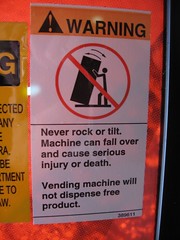In January my stats dropped to an all time low. There are a number of reasons, I guess.
One reason is that I haven’t been writing much lately. Just an occasional link. Short cross-references to my Flickr stream. That’s it.
Another reason is my retro-style homepage, which points to my other life stream options (Twitter, Flickr, Google Reader, Delicious) and probably diverts (or puts off) a lot of people.
Maybe another reason is the second WordPress installation I’ve added to showcase an idea. Maybe the Google bot doesn’t like this kind of setup. I’m not sure. It’s not duplicate content.
Although I think I am still listed.
It is surprising because I have over 4 years of content here.
Fact is I could start a confessional style blog and publish details galore. And only five people would read it.
Because the amount of information floating around the Internet has exploded. Gone are the times where a blog post on a specialized topic would get hits.
Somehow I find this strangely comforting. I can hide in full public view. Hide on the Internet.
And the other message hidden in there is that building communities is hard work.
As enterprises try to follow their customers and consider integrating Facebook and Twitter into their marketing programs, I think it’s important to hold up some warning signs.
There are no quick wins in this.
You’ll need Scoble-like marketing resources. Using a video-only communication strategy is not the answer. People are different. Some like screencasts. Some like text.
Scoble says:
Truth is that if you want to build an audience on the web you must use EVERY tool available.
You’ll need to walk the fine line in your choice of communication (no marketing glib, no sales talk, no PR gobbeldygook, a real personal voice, useful and good content at frequent intervals). I read somewhere that the first Flickr team greeted every new sign-up personally.
You’ll need to have a clear community policy.
And above all you need to be aware that you’re giving your data to a third party.
Everything you publish on the Internet is up for grabs. Everything.
I’m not saying that enterprises should not invest in social media. I’m saying enterprises should carefully consider the costs. Maybe that’s a possible business model for Twitter… corporations pay for the ability to export their data and contacts at all times. A service agreement for data?
What happens if Yahoo sells Flickr to a stock photo agency?
As I watch the demise of Technorati and Xing, I keep getting reminded of Adam Greenfield’s talk on “Everyware”.
As we used to say in Blantyre: Amakhala scared.
If you’re here and reading this. Thank you. I’m not here for the stats. I’m here to learn. So far the positive effects outweigh the negative bits by far. And I believe everybody needs to become aware of this ocean of data that surrounds us and become a social media expert of sorts.


why blogging and commenting and blog discussions sort of get ripped apart (my humble observations and thoughts…):
1) by services such as back type etc. (seems to me that it has become equally important to being able to “portfolio” one’s commenting activity on the web, not just one’s blogging activity — being a frequent commenter/discusser on A-Blogs seems to be a means to establish one’s standing on a specific web community),
2) people scout blogs for stuff they can bookmark; for info and data they can use – no one really says thanks anymore or adds their thoughts; I see from my stats that people definitely found answers to what they were looking for, but not ONE ever left a comment, and some even copied my posts verbatim; it’s pretty discouraging.
3) people use newsreaders to being able to read blog posts offline or on their mobile apps; this in turn nurses sort of a commenting lazyness.
4) lastly, your newsfeed can be hard to cope with, because besides your blogfeed and your delicious bookmarks you also feed your flickr stream into it, which can mean a lot of photos in one batch at times. When I check Google reader, I have to click over to chip to see whether there really is new content. Not to say that your photos weren’t interesting; they definitely aren’t, but it can mean quite some clicks before I come across new chiperoni content. I sometimes don’t click over, because I’m short in time….